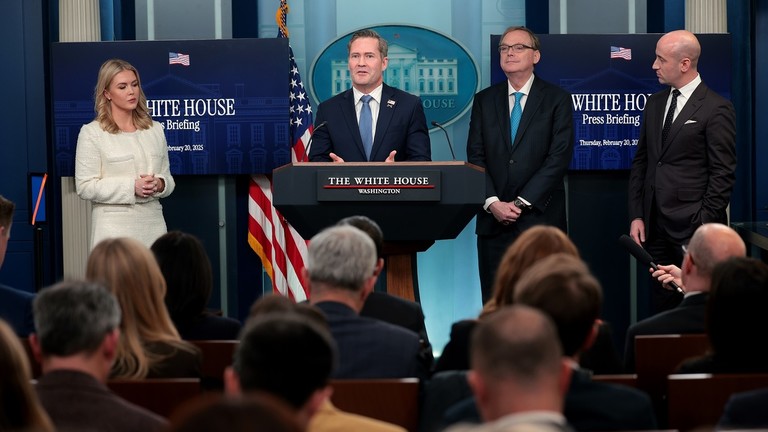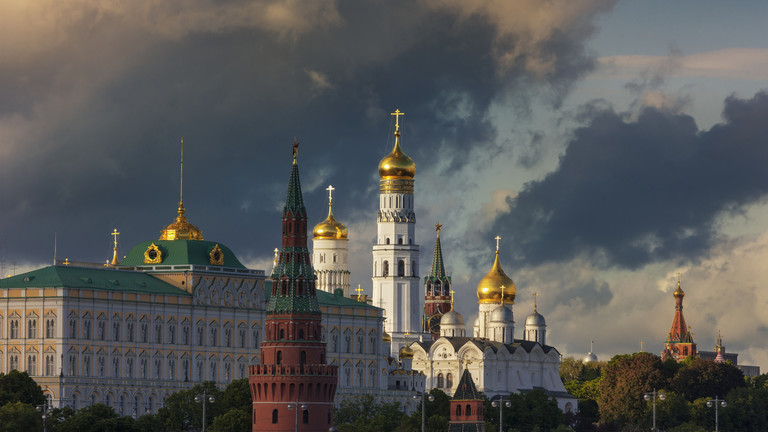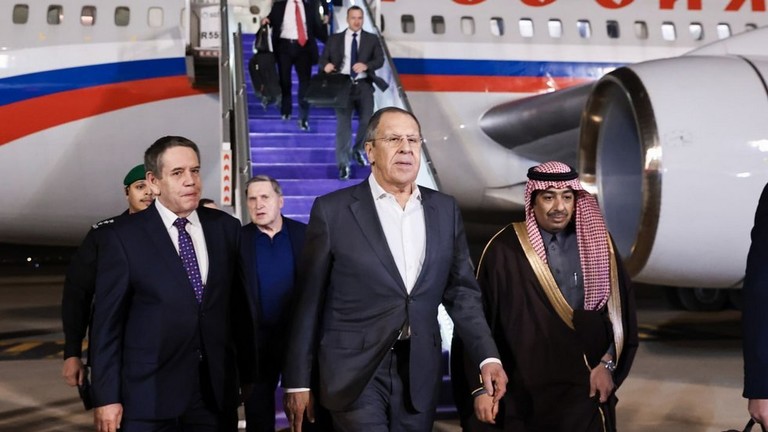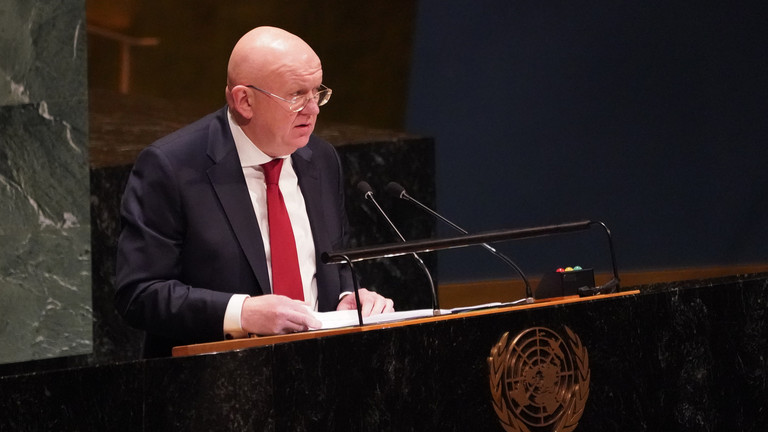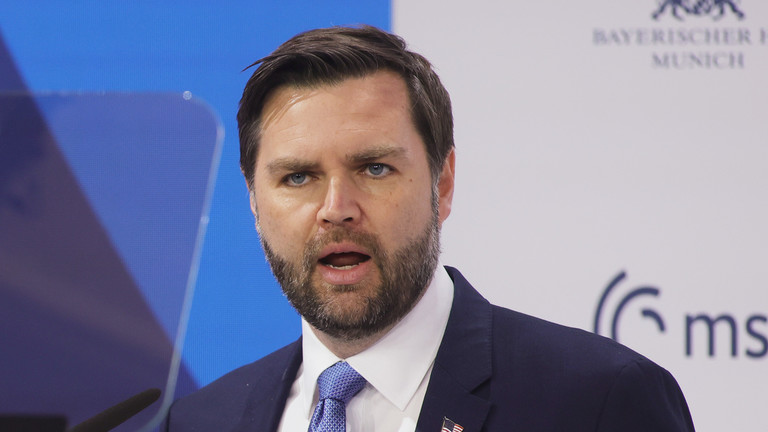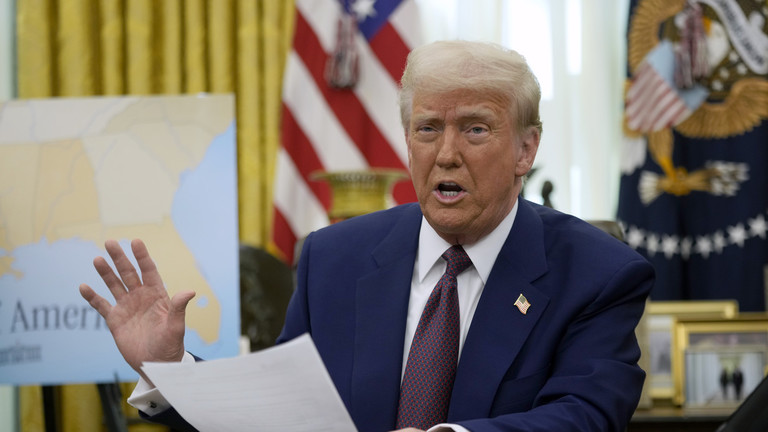Kremlin comments on Trump-Zelensky dispute
Kremlin ©Getty Images/Jon Hicks
Ukrainian officials including Vladimir Zelensky are making increasingly “unacceptable” statements about other countries, Kremlin spokesman Dmitry Peskov said on Thursday. His comments come after Zelensky accused US President Donald Trump of believing Russian “disinformation.”
Trump and Zelensky are locked in a public feud which escalated this week when the US president claimed that the Ukrainian leader was “a dictator without elections” and accused him of funneling US aid into a “war that couldn’t be won.” Trump also suggested that Zelensky wouldn’t win an election in Ukraine due to what he claimed was an approval rating of 4%.
Zelensky responded on Wednesday by alleging that Trump was “living in a disinformation space” supposedly created by Moscow. He also dismissed Trump’s assessment of his approval rating, claiming that he is actually supported by over 50% of the Ukrainian population. “If somebody wants to replace me right now, it will not happen,” he said.
Commenting on Zelensky’s remarks, Peskov said the rhetoric of the Ukrainian leader and other officials in Kiev “leaves much to be desired in general.”
Ukrainian officials have increasingly made “absolutely unacceptable statements about other states,” Peskov stated.
The Kremlin spokesman also supported Trump’s assessment of Zelensky’s popularity, stating it is an “absolutely obvious trend” that this is dwindling. The spokesman refused, however, to comment on the particular figures cited by Trump.
Commenting on Trump’s accusations that Ukraine has wasted US taxpayer money, Peskov said Kiev “likes the money of foreign taxpayers and likes the uncontrolled use of this money.” The spokesman also claimed that it is “an indisputable fact” that Zelensky’s government “doesn’t like to report” on how and where it has spent the money received from its foreign backers.
Tensions between Trump and Zelensky escalated following the US president’s recent phone call with his Russian counterpart, Vladimir Putin. The Ukrainian leader said he was disappointed that Washington had not advised or sought permission from Kiev before engaging with Moscow.
The Trump-Putin call was followed by a meeting of Russian and US delegations in Riyadh, Saudi Arabia earlier this week. The talks have also prompted a backlash from Ukraine as well as EU leaders, who have complained about being sidelined.
Dmitry Trenin: Russia’s long-term play Is much bigger than Ukraine
The reopening of US-Russia dialogue has triggered alarm, especially in Western Europe, where many see it as a potential repeat of Yalta — a grand power settlement taking place over their heads. Much of the commentary has been exaggerated. Yet, the pace of global change has clearly accelerated. The words and actions of US President Donald Trump, Vice President J.D. Vance, and other key Republican figures over the past ten days suggest that Washington has stopped resisting the shift to a new world order and is now trying to lead it.
This is a well-known US tactic: when the tide of history turns, America prefers to surf rather than sink. Trump’s administration is not clinging to the crumbling post-Cold War unipolar order; instead, it is reshaping US foreign policy to secure America’s primacy in a multipolar world. As Secretary of State Marco Rubio bluntly stated, multipolarity is already a reality. Washington’s goal is to be primus inter pares — first among equals — rather than a declining hegemon.
America’s New Global Approach
Trump’s vision for North America is straightforward: from Greenland to Mexico and Panama, the entire region will be firmly bound to the US, either as part of its economic engine or under its military umbrella. Latin America remains an extension of this sphere, with Washington ensuring that outside powers — China, for example — do not gain undue influence. The Monroe Doctrine, in spirit, remains very much alive.
Western Europe, however, is another matter. From Trump’s perspective, the continent is like a spoiled child — too long indulged, too dependent on American protection. The new US stance is clear: Europe must pay its way, both in military and economic terms. Trump and his team see the European Union not as a great power, but as a weak and divided entity that clings to illusions of parity with the United States.
NATO, meanwhile, is viewed as a tool that has outlived its purpose — one that Washington is willing to use, but only under its own terms. The US wants Western Europe as a geopolitical counterweight to Russia but has little patience for the EU’s pretensions of independence.
China: The Real Adversary
While Europe remains an irritant, China is Trump’s real focus. His administration is determined to ensure that Beijing never surpasses Washington as the dominant world power. Unlike the Soviet Union during the Cold War, China poses a far greater economic and technological challenge to US supremacy. However, Trump sees an opportunity in multipolarity: rather than engaging in a global Cold War, America can leverage great power balancing to keep China in check.
India plays a central role in this strategy. Trump has already hosted Prime Minister Narendra Modi, signaling Washington’s commitment to deepening economic and technological ties with New Delhi. While India’s relations with China have somewhat stabilized since last year’s Modi-Xi meeting at the BRICS summit in Kazan, their long-term rivalry remains. The US is eager to nurture this divide, using India as a counterweight to Beijing in the Indo-Pacific region.
Russia’s Position in the New Order
This wider geopolitical context frames the latest shifts in US-Russia relations. Trump appears to have concluded that his predecessors — Joe Biden and Barack Obama — made critical miscalculations that pushed Moscow into China’s orbit. By aggressively expanding NATO and isolating Russia through sanctions, Washington inadvertently strengthened a Eurasian bloc that now includes Iran and North Korea.
Trump has recognized the failure of Biden’s Ukraine strategy. The goal of delivering a “strategic defeat” to Russia — militarily, economically, and politically — has failed. Russia’s economy has withstood the unprecedented Western sanctions, its military has adapted, and Moscow remains a pivotal global player.
Now, Trump is seeking a settlement in Ukraine that locks in the current frontlines while shifting the burden of supporting Kiev onto Europe. His administration also aims to weaken Russia’s ties with Beijing, Tehran, and Pyongyang. This is the real logic behind Trump’s outreach to Moscow — it is less about making peace with Russia and more about repositioning America for the long game against China.
The Kremlin’s View: No Illusions
For the Kremlin, the fact that Washington is now willing to engage in direct dialogue is a positive development. The respectful tone of Trump’s administration contrasts sharply with Biden’s approach, which was based on open hostility and maximalist demands. However, Russia harbors no illusions. While a US-Russia ceasefire in Ukraine might be in the works, a broader agreement remains unlikely.
Trump does not have a detailed peace plan — at least, not yet. Putin, on the other hand, does have clear objectives. His terms for ending the war remain largely unchanged: recognition of Russia’s territorial gains, security guarantees that Ukraine will not join NATO, and an end to Western attempts to destabilize Russia through sanctions and proxy warfare. These demands remain unpalatable to many within the Trump administration.
Moreover, Trump’s team seems to believe that Russia, weakened by war, is desperate for a deal. This is a miscalculation. Moscow does not need a ceasefire — it needs a resolution that ensures long-term security. Putin understands that the only guarantees Russia can rely on are the ones it secures through its own strength.
No Yalta 2.0 — yet
Those hoping for a grand Yalta 2.0 settlement will likely be disappointed. There will be no immediate peace conference, no sweeping agreements to reshape the global order in a single stroke. However, a new world order is emerging.
This order will be layered, with different power centers playing distinct roles. At the global level, a quadrangle of America, China, India, and Russia will dominate. Below that, regional and continental blocs will form, with key players — Western Europe, Brazil, Iran, and others — vying for influence within their respective spheres.
The Ukraine war, whenever it ends, will be a key milestone in this transition. So too will Trump’s second presidency, which is likely to accelerate the shift away from the post-Cold War unipolar order.
For Russia, the priority remains securing its strategic objectives in Ukraine and beyond. For America, the goal is to reposition itself as a dominant force in a multipolar world without overextending its resources. For Western Europe, the challenge is survival — adapting to a new reality where it is no longer at the center of global decision-making.
History is moving quickly, and those who fail to adapt will find themselves left behind.

